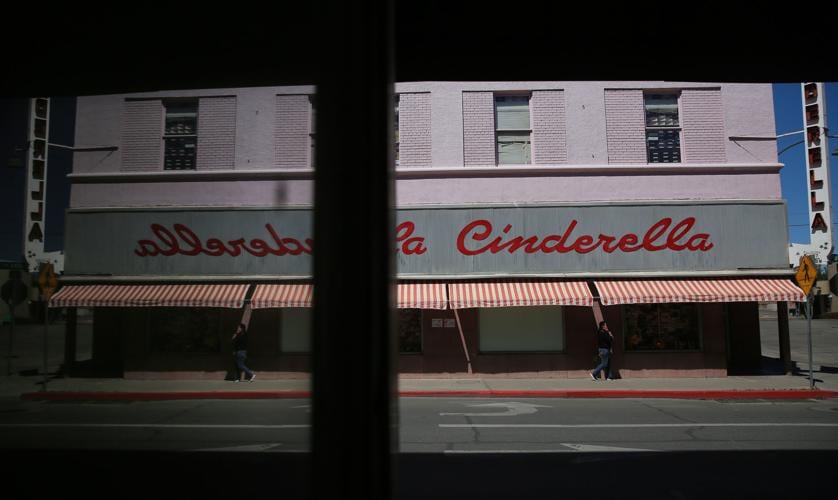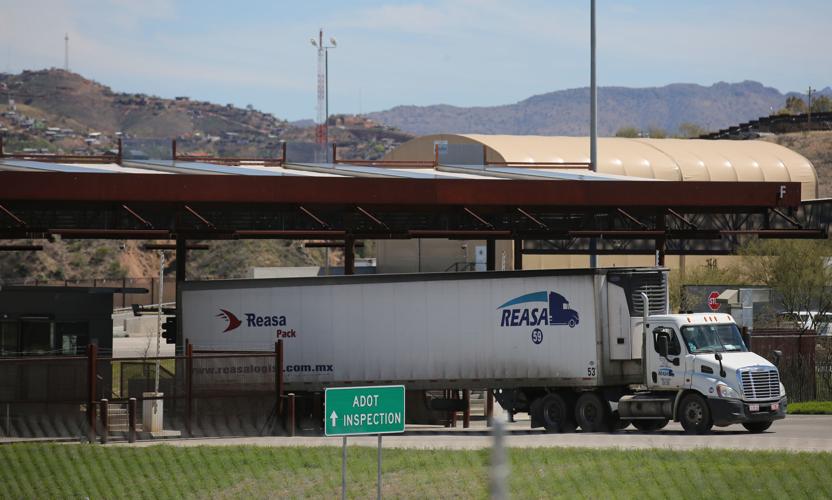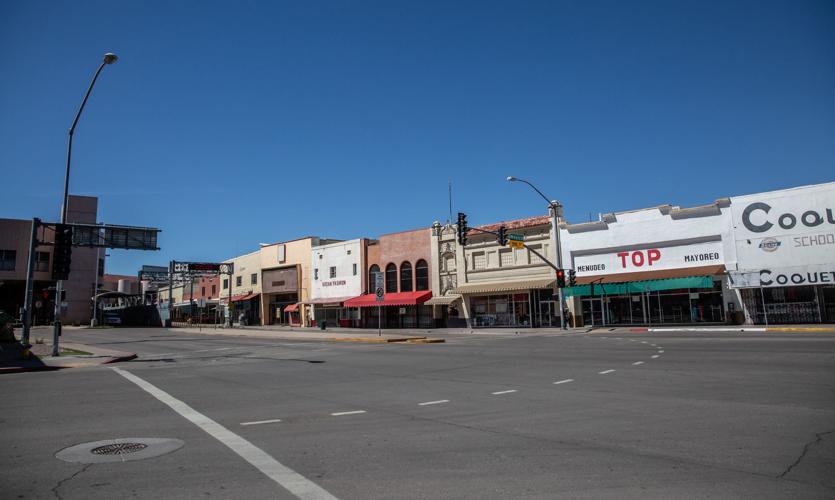By Curt Prendergast and Vianney Cardenas
Merchants in downtown Nogales, Arizona, put padlocks on their doors and lowered metal gates over their storefronts last week, one of the only options left to them now that most of their customers can’t get to their stores.
The vast majority of their customers are Mexican shoppers who buy jeans, dresses, shirts, toys and numerous other items. Last weekend, U.S. officials started blocking non-essential travel from Mexico as a precaution against the coronavirus. Now, those shoppers are no longer allowed to cross the border and browse the stores that run along Morley Avenue right up to the border.
Within days of the travel restrictions taking effect on March 21, the lines of cars crossing the border into the United States all but vanished. The flow of pedestrians slowed to a trickle, leaving the once vibrant Morley Avenue with the air of a ghost town.
Tourists and shoppers from Mexico must wait to cross the border until at least April 20, when U.S. officials decide whether to cancel or extend the travel restrictions. Similar measures are in place on the U.S.-Canada border.
The travel restrictions came after stores in downtown Nogales already were seeing fewer shoppers due to concerns over the coronavirus, said Bruce Bracker, former owner of a department store on Morley Avenue and a Santa Cruz County supervisor.
But the prospect of losing Mexican shoppers, who account for more than 80% of the business on Morley Avenue, forced store owners to close their doors, Bracker said.
Without Mexican shoppers, “a lot of local guys are closing because they can’t afford to pay people,” Bracker said.
In a border city like Nogales, shoppers from Mexico are vital to local stores, gas stations, restaurants and other businesses, providing more than 60% of the city’s sales tax revenue, said Mayor Arturo Garino.
Around this time last year, the city’s three ports of entry saw people walk across the border into Nogales more than 280,000 times, according to U.S. Department of Transportation statistics for April 2019.
An additional 550,000 crossings were made by car that month. In all of 2019, Nogales ports saw more than 10 million crossings.
Soon after the restrictions over coronavirus took effect, the Nogales City Council held a special session and declared a financial emergency.
Shopping trips to Nogales, as well as to Tucson, are going to be “reduced tremendously,” Garino said.
Even if the restrictions are canceled next month, the hit to local-businesses owners could be long-lasting, Garino said.
“We don’t know what it will take for them to come back,” Garino said. He worried the “uphill battle is going to be worse than we expected.”
The mayor of Douglas, Robert Uribe, had similar concerns for his border town located about 80 miles east of Nogales.
“It’s going to take a while for us to rebound from this,” Uribe said.
The lines of travelers crossing the border from the Mexican city of Agua Prieta to Douglas have dwindled and the travel restrictions will have an immense effect on the economy, Uribe said.
The ports in Douglas saw 3.6 million border crossings in 2019, according to the U.S. Department of Transportation. “Our neighbors are an integral part of our economy, without a doubt,” Uribe said.
More than 70% of the city’s sales tax revenue comes from Mexican shoppers, Uribe said. Retail stores and other businesses in Douglas are constantly packed with people purchasing their essentials to take back home. They also make frequent visits to gas stations.
Local businesses will need a lot of support, Uribe said. Many of them “live check to check” and have to stay open every day to survive.
“There’s no disposable income here available, so everything is day by day,” Uribe said.
Crossings at ports of entry along the length of Arizona’s border with Mexico dropped by roughly half on the first day of the travel restrictions, according to a chart released by Customs and Border Protection last week.
At Nogales’ main port of entry, one street over from Morley Avenue, vehicle and pedestrian traffic was just a trickle on Tuesday. Most of the cars coming through the port had Arizona license plates, with a handful of plates from California and Sonora, the Mexican state that shares a border with Arizona.
In the city’s other main commercial area on Mariposa Road, most of the big-box stores, such as JC Penney’s and Marshall’s, had signs on their doors saying they were temporarily closed. The exception was the crafts store Hobby Lobby. Some had signs saying they were closed due to the coronavirus.
Bracker said the decisions to close the big-box stores were made by corporations at the national level, rather than as a reaction to travel restrictions at the border.
The Walmart store in Nogales, which is regularly packed with shoppers from Mexico, was busy on Tuesday. Nearly all the cars in the parking lot had Arizona license plates.
Signs in Spanish along the northbound lanes of Interstate 19 encourage Mexican shoppers to visit stores and medical clinics in Tucson.
One of those signs advertises Tucson Appliance and Furniture Company, which gets about 10% of its customers from Mexico.
Owner Chris Edwards said the restrictions on Mexican shoppers hadn’t hit his business yet, but that could change if the restrictions continue for months.
For the moment, “I’m so busy right now, I don’t know what to do,” Edwards said.
Many Tucsonans are staying home as part of the social-distancing strategy to contain the coronavirus. Those Tucsonans are using their appliances more and thinking about upgrades, Edwards said.
In Tucson, the travel restrictions will “definitely have an impact on our community,” said Felipe Garcia, executive vice president of Visit Tucson.
Mexican tourists and shoppers spend about $1 billion each year in Pima County malls, stores, restaurants and other businesses, Garcia said.
The timing of the restrictions was particularly unfortunate because they will run through Holy Week in April, Garcia said. Holy Week is one of the three “big spikes” Tucson businesses see in Mexican shoppers, along with back-to-school shopping in the summer and the Christmas season.
Garcia said he hopes the restrictions won’t need to be extended through the summer.
The Tucson Spectrum mall on Tucson’s south side was relatively busy on Thursday, but nearly all the cars in parking lots were from Arizona, with a smattering of license plates from Utah, Washington, Idaho and other states.
The Tucson Premium Outlets mall, which sees many Mexican shoppers, was closed as a coronavirus precaution before the travel restrictions were put in place.
The Tucson Mall, where Mexican shoppers traditionally make up a sizable portion of the clientele, was largely deserted last week.
Signs on many storefronts said they were closing due to the coronavirus and offered online options for purchases.
Three teenagers walked through the mall on Wednesday, marveling at the mall’s emptiness as they narrated a video one was taking with his smartphone.
While retail stores in Nogales felt the pinch of fewer Mexican shoppers, trucks carrying fruits, vegetables and industrial goods continued to roll through the port and inspection stations on Nogales’ west side before heading to Interstate 19.
The produce industry was “very fortunate” that it was exempt from the travel restrictions, said Jaime Chamberlain, chairman of the Greater Nogales Santa Cruz County Port Authority and president of Nogales-based produce company J-C Distributing.
Still, Chamberlain said he was “extremely concerned for our community” now that Mexican tourists and shoppers could no longer support the local economy.
The produce season is running normally in Mexico and “every product that you want right now is available,” Chamberlain said.
The bare shelves at some supermarkets in Tucson and elsewhere are the result of logistical problems at chain stores, he said, rather than problems with the supplies.
“Every produce warehouse in Nogales is packed,” Chamberlain said.
The assembly plant industry in Nogales, Sonora, also was untouched by the travel restrictions, said Joshua Rubin, vice president of Javid, a shelter company that facilitates foreign companies setting up production in Nogales, Sonora.
“It did not affect the industry one bit,” Rubin said.
The travel restrictions created some confusion for U.S. citizens living in Mexico.
The rules about who can cross are still somewhat vague, but for the time being it appears the restrictions do not apply to U.S. citizens, legal permanent residents, Mexican citizens working in the U.S. and certain types of industry.
The State Department warned U.S. citizens living abroad on March 19 that they should come back immediately or risk being stranded outside the country indefinitely. That statement apparently was exaggerated.
CBP allowed U.S. citizens to cross back into Arizona last week, including a couple from Minnesota who returned from a trip to the dentist in Nogales, Sonora, without any issues with customs officers.
The warning from the State Department apparently caused some anxiety for U.S. expatriates living in the beach town of San Carlos, Sonora, according to Bracker.
After a day or two of little traffic in Nogales following the announcement of the travel restrictions, “all of a sudden we had a huge line” at the downtown port of entry on Monday afternoon, Bracker said.
The vehicles had U.S. license plates and belonged to U.S. expatriates from San Carlos who said to themselves, “‘We gotta get out,’” he said.






